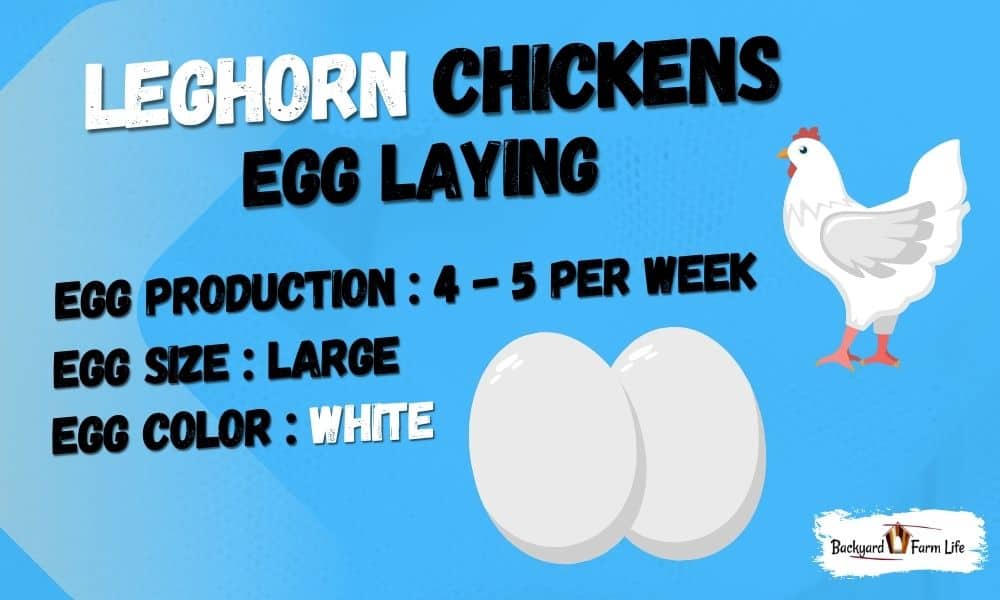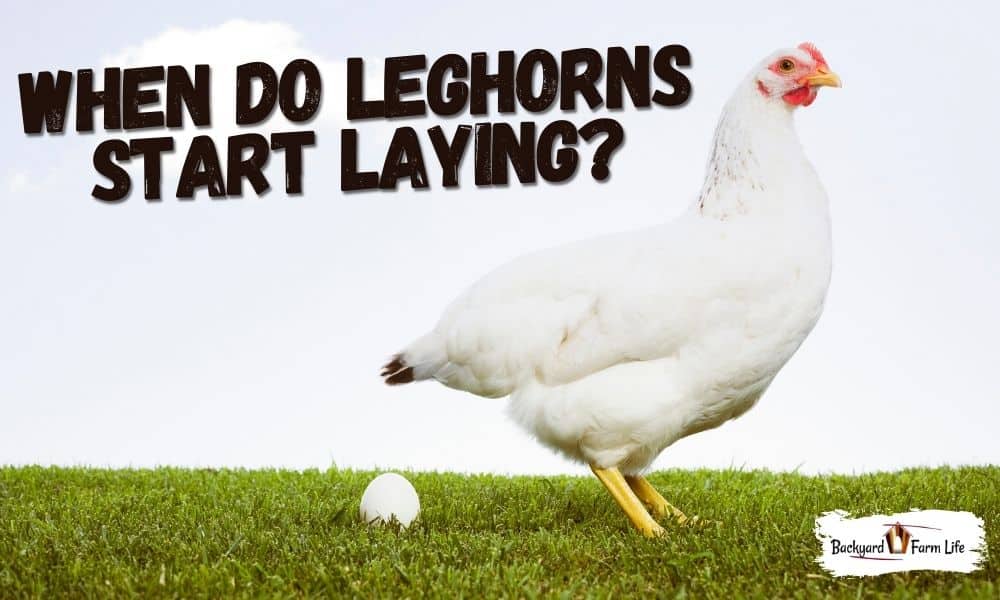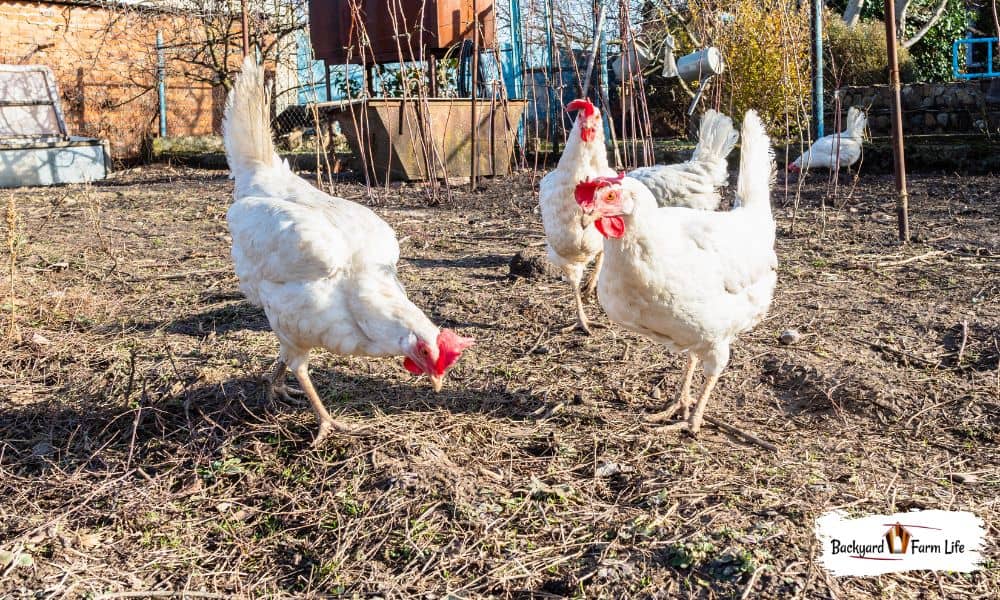You know what they say, “if you own Leghorns you’ll need two baskets.”
Leghorns have to be some of the most consistent and reliable egg layers out there. Especially considering they are a heritage breed rather than a production hybrid.
Although we love them for their personality, confidence, and general companionship, it’s always a joy to collect their beautiful white eggs daily.
Whether you’re new to raising Leghorns, have been raising them for a while, or are considering raising them in the future, we’ve got you covered.
Here’s absolutely everything you should know about a Leghorn chicken’s egg laying, from their general egg-laying characteristics, to a Leghorn’s first eggs, to maximizing their egg production.
Contents
Leghorn Chicken’s Egg Characteristics Summary

Leghorns are brilliant egg layers by nature. In fact, a white Leghorn chicken holds the verified world record for most eggs laid in a year, reaching 371 in just 364 days. Really pushing the boundaries of the 24-hour egg-laying cycle.
Although this sounds like the work of a super-chicken, even the average Leghorn has fantastic egg production.
Leghorns lay between 4 – 5+ eggs per week, averaging between 250 – 300 per year.
Although there are a few varieties of Leghorn chickens, all Leghorns lay large white eggs, weighing about 2 ounces.
Leghorns don’t often get broody and they are able to lay pretty consistently throughout the entire year. Certainly makes them one of the most reliable egg layers out there!
When Do Leghorn Chickens Start Laying Eggs?

When chickens reach maturity, males will start to crow, and hens will start to lay.
So, assuming you’ve got yourself Leghorn hens instead of Leghorn roosters, you can expect your Leghorns to begin laying from as young as 4 months old (which is pretty quick by egg-laying standards!)
Although the age of maturity does differ between individual chickens, most Leghorn hens will start laying between 4 – 5 months old, with very few laying their first eggs after 6 months old.
Of course, this can depend on their diets, environment, and individual differences too!
Consistent, voluminous, reliable, AND early egg layers? Is there anything that Leghorns can’t do well!?
How Many Eggs Do Leghorn Chickens Lay Per Year?

One of the most important questions any chicken owner wants to know is: How many eggs am I going to get?!
Luckily Leghorns are rather gifted in terms of their egg production. Not only do they start laying from a relatively young age, but they reliably lay all year round too.
You can expect to receive at least 4 – 5 large white eggs per leghorn hen per week, averaging about 250 – 300 eggs per year.
A Leghorn’s egg production does vary from chicken to chicken, but they will reliably lay at least 4 eggs per week. Their egg-laying can be optimized by diet and environment too.
A Leghorn’s reliable egg laying is often why they are bred with other breeds, to pass down its fantastic egg-laying capabilities — like with the infamous Legbar chicken.
When Do Leghorn Chickens Stop Laying Eggs?
Compared to most other chicken breeds out there, Leghorn chickens mature quickly and unfortunately retire quickly.
So although they start laying eggs from a young age AND lay 4 – 5 large-sized eggs every week, a Leghorn’s egg production does tend to decline from as young as 4 years old.
You can expect Leghorn hens to lay:
- 250 – 300 eggs per year over the first 2 -3 years.
- 200 – 250 eggs from 3 – 4 years,
- about 150 – 200 eggs from 5 years old.
After 5 years old you’ll find Leghorns egg production rapidly declines, but you may still get a few eggs every week for another year or so.
This slightly early decline in egg production is most likely due to their high output nature more easily wearing out their reproductive systems.
Do Leghorn Chickens Lay In Winter?
In the middle of winter, when the days get shorter and the temperature gets lower, many chicken breeds preserve their energy, huddle up and keep warm, and sometimes, stop laying their eggs altogether.
Luckily, Leghorns don’t seem to mind the cold. As long as your Leghorns are well-fed and kept in a warm coop, they will continue to lay all through winter.
In saying that, because Leghorns have such great large combs and wattles, they are much more susceptible to frostbite.
So, it’s best to take extra care of your chooks on those particularly cold days
Caring For Leghorn Hens
Although these fundamentals apply to all types of chicken breeds, if you’re raising Leghorns you’ll want to keep these three things front of mind:
- Because Leghorns keep their egg production motor going and going, it’s important to be sure they are having enough calcium, and a good 16-18% protein in their diets.
- Let them free-range: A happy chook is a healthy chook, and a healthy chook lays the best eggs. Leghorns are particularly energetic, they thrive in a free-range environment.
- Exposure to real sunlight: Light is a key factor in a hen’s egg-laying cycle, letting your flock out of the coop at sunrise will ensure they get sufficient time in direct light.
Quick Summary
Not to discount their open curiosity and hilarious personalities, but Leghorn chickens are most known for their exceptional, world-class egg-laying.
Leghorns start laying early, from as young as 4 – 5 months old. Once your hens get the hang of things you can expect between 4 – 5 eggs consistently per week, up to about 250 – 300 per year.
They’ll happily lay all year round if they’ve been eating the right food, are kept in a warm and safe environment, and get a bit of time stress-free in the sun.
It’s no wonder so many hobby farmers say Leghorns are the perfect chook!
